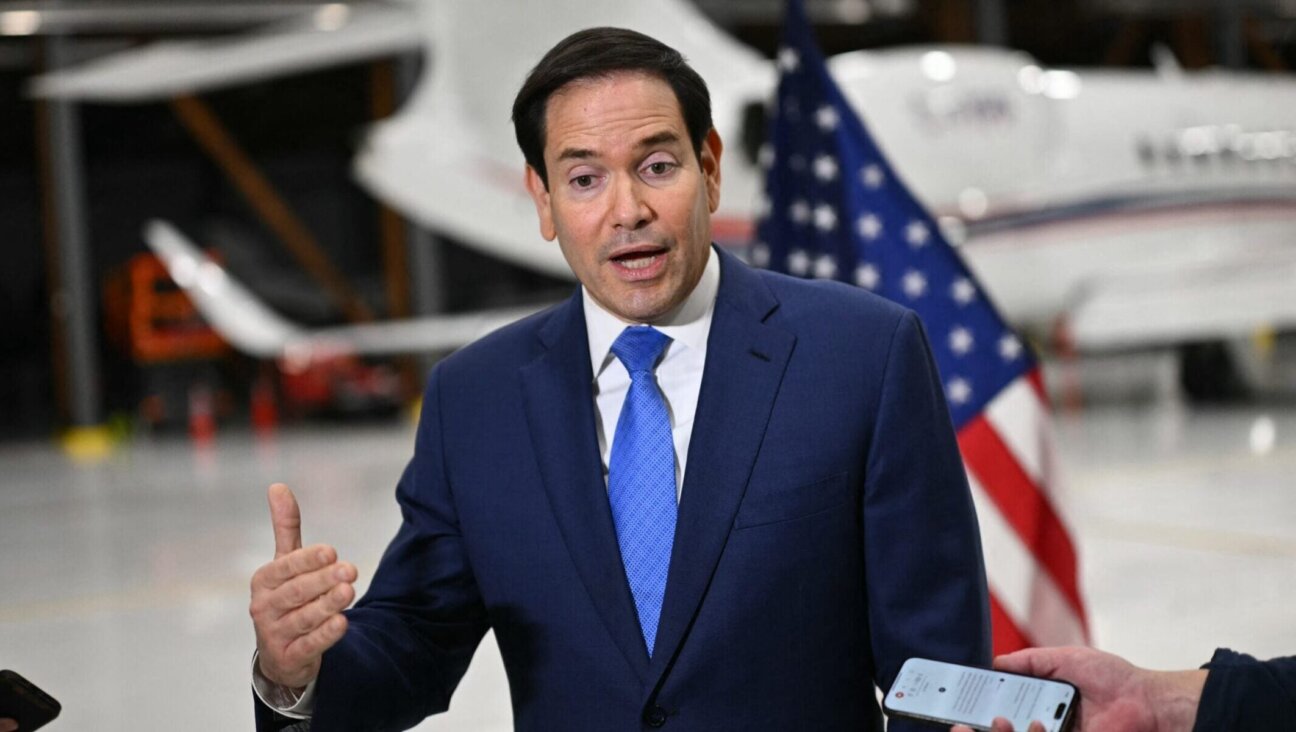Israel’s Opposition Gets A Boost In Polls From New Leader Avi Gabbay

Avi Gabbay Image by Getty Images
JERUSALEM (JTA) — After political newcomer Avi Gabbay’s surprise election to head the Labor Party, his center-left political coalition has surged back to life in public opinion polls.
Two surveys conducted on behalf of Israel’s main news channels Tuesday showed the Zionist Union winning 20 to 24 Knesset seats if elections were held today, compared to the Likud’s 25 to 29. In a sign of hope for Israel’s beleaguered political left, support came not only from voters who abandoned the party in recent months, but also from Arabs and moderate right-wingers.
If the results hold, they would make the Zionist Union, comprising the Labor and Hatnua parties, the main challenger to the right-wing Likud party’s rule. But Likud remained dominant even amid a high-profile scandal close to Prime Minister Benjamin Netanyahu.
The next national election will be held in 2019 unless the prime minister calls for an early vote.
According to a poll by Channel 2, Likud would win 25 seats in a snap election and Zionist Union 20, followed by Yesh Atid (18), Jewish Home and the Arab Joint List (13 each), Kulanu (8), United Torah Judaism (7), Yisrael Beiteinu (6), and Shas and Meretz (5 each).
A Channel 10 poll had Zionist Union performing even better. Likud still led with 29 seats, but Zionist Union had 24, followed by Yesh Atid (18), Jewish Home (14), the Arab Joint List (8), Yisrael Beiteinu (7), Kulanu and United Torah Judaism (6 each), and Shas and Meretz (5 each).
Gabbay, 50, a self-made millionaire who joined Labor six months ago, defeated Amir Peretz, a former party leader and defense minister, in a runoff election Monday. The incumbent leader, Isaac Herzog, had been knocked out in the first round, but announced Tuesday he would stay on as the Knesset opposition leader. Gabbay cannot assume the post because he is not a lawmaker.
In his victory speech, Gabbay pledged to draw on all segments of Israel’s population in a campaign to oust Netanyahu from the office he has held since 2009.
“The State of Israel is headed to elections, we just don’t know the date,” Gabbay reiterated to activists and journalists Tuesday in Tel Aviv. “The campaign to replace Netanyahu begins today.”
The Zionist Union must reach beyond its base if it hopes to vie for power. After leading Israel to independence and for three decades afterward, Labor has not won an election in 18 years. As part of the Zionist Union in 2015, it took 24 of the Knesset’s 120 seats and became the largest opposition party.
However, since then, it has sunk in the polls to as few as 9 seats. Many Israelis who voted for Labor in 2015 recently shifted their support to Yesh Atid, a centrist party headed by the telegenic populist Yair Lapid that at times this year has led in the polls.
Likud, meanwhile, has fluctuated around the 30 seats it now holds.
According to the Channel 10 poll, most of the Zionist Union’s supporters are returning home from Yesh Atid. Some also come from Kulanu, and to a lesser extent Likud.
At the same time, the poll found that 15 percent of voters from the Arab Joint List – a coalition of Arab-Israeli parties formed in 2015 and the third largest Knesset faction — would now vote for Labor.
Carmil Fuchs, a well-known Israeli pollster and statistics professor at Tel Aviv University, said Gabbay appears to uniquely appeal to both Arab and center-right Jewish voters.
“In his speech, Gabbay mentioned that he wants to embrace all the sectors of the population, including the Arabs, Druze and Circassians. That was well received by the Arab population,” Fuchs told JTA. “He also has the advantage of a family who came from Morocco, and the great majority [of Mizrahi, or Middle Eastern, Jews] voted for Likud. So I think he has a chance to appeal to those people.”
One of eight children born to working-class Moroccan immigrant parents, Gabbay is also seen as a political centrist when it comes to security and economics. He helped form the center-right Kulanu on entering politics in 2015, and served in Netanyahu’s government as environmental education minister for a year before quitting in disgust. As a former telecom exec, he can hardly be called a socialist.
However, Fuchs noted that the Gabbay “buzz” might not last for the Zionist Union. The party has “a long way to go” to become Israel’s largest, he said. Given the results of his poll, a Zionist Union-led coalition of centrist, left-wing and Arab parties would fall just short of the majority of Knesset seats required to form a government. Arab parties for ideological reasons have never joined an Israeli government, though they supported Prime Minister Yitzhak Rabin’s government from the opposition during the Oslo peace process.
For their part, haredi Orthodox parties have long preferred to serve in right-wing governments, and could likely only be coaxed into serving under the Zionist Union if the party already had a governing majority.
Fuchs also said the Zionist Union benefited in the polls from scandals that may have weakened support for other parties.
The Arab Joint List has been riven by infighting following the arrest and imprisonment this month of former member Bassel Ghattas, who admitted to smuggling cellphones and other contraband to Palestinian security prisoners in Israeli jail. And on Monday, police questioned six people, including Netanyahu’s personal lawyer, on suspicion that they tried to sway a multibillion-dollar purchase of naval vessels in favor of German shipbuilder ThyssenKrupp. Netanyahu has repeatedly and adamantly denied any involvement.
But even with the “submarine affair” making headlines, Likud’s showing in the recent polls was nearly the same as at the ballot box in 2015. Netanyahu, too, remained the preferred candidate to lead Israel, according to the polls.
Asked to choose between Netanyahu and Gabbay, Channel 10 found that 51 percent of Israelis preferred the incumbent over the new Labor boss. Just 25 percent opted for Gabbay over Netanyahu; the remaining quarter of respondents did not know.
When other party leaders were included, the support broke down this way: Netanyahu, 30 percent; Gabbay, 14 percent; Yesh Atid, 12 percent; Jewish Home’s Naftali Bennett, 8 percent; Yisrael Beiteinu’s Avigdor Liberman, 7 percent, and “do not know,” 22 percent.
In a similar Channel 1 poll, Lapid finished ahead of Gabbay, 16 to 13 percent. Netanyahu was the top choice, again with 30 percent support, and Bennett placed fourth with 7 percent. A third of respondents went with “none of the above.”
Shy of storming to the prime ministership, Fuchs said, Gabbay could hope to strengthen Israel’s center-left and wait for an opportunity.













